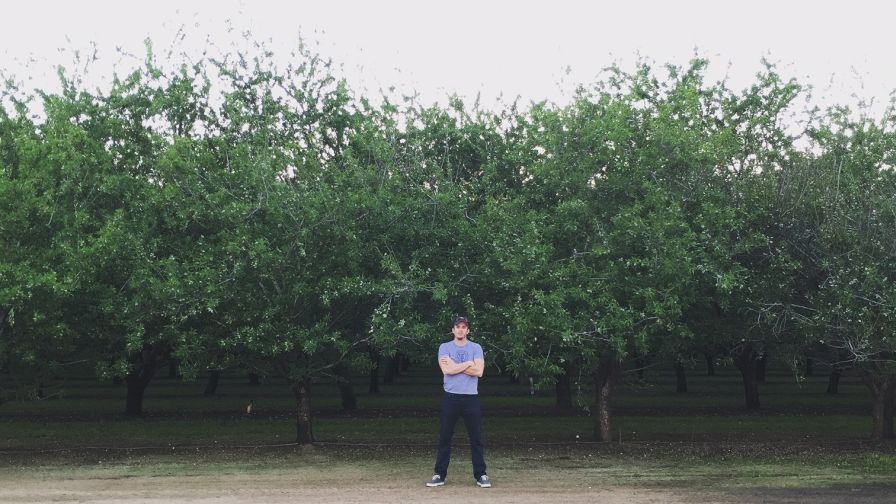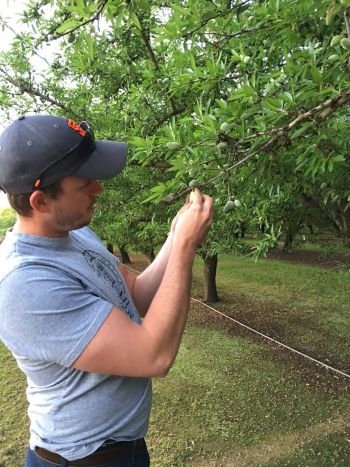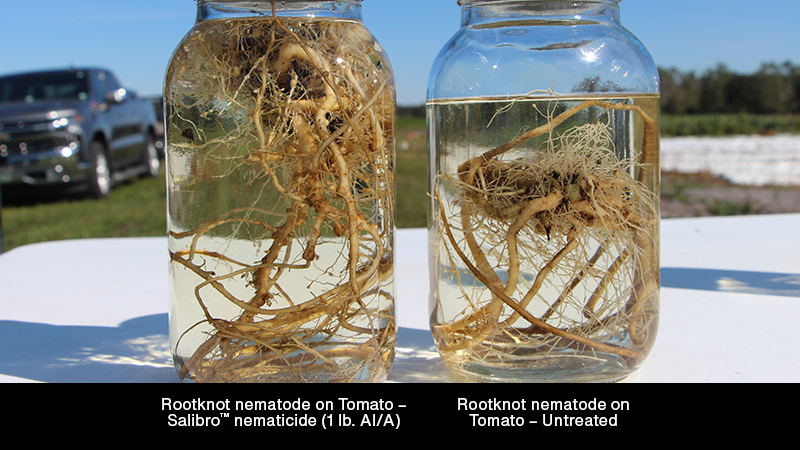Get To Know Rory Crowley Of The Almond Leadership Program

Rory Crowley (Photo credit: Rory Crowley)
Rory Crowley is a member of the Almond Leadership Program’s class of 2016. Now the assistant operations manager and director of business and research development for the Nicolaus Nut Company, Crowley talks about how the Almond Leadership Program helped him prepare for the future.
How did you become interested in the almond industry?
In December 2013 I met my wife. She told me her dad was an almond and walnut farmer, and, being the flirt that I was back then (I’m still a flirt with her!), and wanting to make her laugh and get a few dates, the nut jokes abounded. We lived in Washington, DC, I was living on the Hill and working for a new museum, and she was working at a human rights non-profit.
As we became more and more serious, I started visiting California with her. Chico was where she was from, and where her dad has his almond and walnut operation. I loved California, the nut industry, and the people, especially the Nicolaus family.
One thing led to another, we got engaged, and for a number of reasons, we moved to Chico right before the wedding. I started helping on the ranch, and haven’t looked back since. I love every minute of it. I am no stranger to hard work, and the nut industry certainly has its challenges — physical especially, but also mentally and emotionally. I worked corporate concrete for a family operation back east during breaks from school, and as such learned how to operate heavy equipment, how to use a shovel, and learned the value and satisfaction for literally sweating for a paycheck. Who knew I would use that knowledge and experience in the almond industry? I didn’t.
How long have you been involved in the almond industry?
Truth be told, I have only been involved in the industry for about a year. My background is in a completely different field.
For the last ten years I have been in academics. I received my bachelor’s degree in Philosophy and my master’s degree in ancient Christian texts. Basically, I am a historian that knows a lot of dead languages. My master’s program was a four-year program, which I turned into five.
I often think of the movie “Tommy Boy,” when Tommy (Chis Farely) says to Richard (David Spade), “You know, a lot of people go to college for 7 years,” and in reply, Richard says, “I know… they’re called doctors.” Well, I’ve been in school for 10 years and I’m still not a doctor… If I didn’t meet the love of my life, Cassi, I would have likely gone overseas to get a Ph.D.
During an introductory ice-breaker for the program, each participant had to bring three or four items to show the 2016 class, to give people a feel for who they are, as it were. I wore green to signify that I was the greenhorn of the group, knowing virtually everyone has been involved for much longer than myself. I also showed my library cards from around the world. Yes, that’s right — library cards. I’m a nerd. The cards that I showed were from the Vatican Library, the Library of Congress, Oxford’s Bodleian Library, and the Chester Beatty Library in Dublin, having done research at each.
Why did you decide to apply for the Almond Leadership Program?
George, my father-in-law, is a well-respected figure in the industry and in the Chico community. He is well-connected and heard of the program. He encouraged me to apply. I read up on it and thought that it was a great opportunity to get to know the industry and network with others.
What do you hope to gain from the program?
The program is vast in its aim and scope, covering virtually every aspect of the industry from planting a tree to marketing product. Topics range from technical and regulatory affairs, to production and environmental concerns, to almond quality and food safety, etc.; we even take personality profiles for the workplace.
As such, I am hoping to gain as much knowledge and expertise as I can from the program. Of course, this program is particularly important to me, being the newbie. Coming at it from an outsider’s objective perspective, the [seminars] have been fantastic. Remember now, I am a nerd, as my wife typically tells me, so being inundated with massive amounts of new and useful information is intensely appealing to me. The monthly seminars do just that.
Lastly, Nicolaus Nut Company is currently creating a value-added division. I have taken on the title of the Director of Research and Business Development. Because of this, information and networking is key to our goals as a company. Only being three months in, I have already gained a vast amount of pertinent information that is currently being used to further our vision as nut growers. The networking that has taken place as a result of the Leadership Program has already given us a competitive advantage to launch product, I believe, and I don’t see this slowing down.

“Only being three months in, I have already gained a vast amount of pertinent information that is currently being used to further our vision as nut growers,” he says. (Photo credit: Rory Crowley)
What do you think are some of the biggest challenges facing the almond industry today?
There are two that immediately come to mind, one semi-short term (with long-term implications and ramifications) and one a little bit further out, but just as important, if not more so (and dire if not dealt with): 1. Almond byproduct price disruptions and the potential for stockpiling and waste; and 2. Water regulation and availability.
1. Almond Byproduct Price Disruptions. A colleague and I, Joe Barnett of Blue Diamond Growers (also a participant of the leadership program), are taking on the first challenge head on with our Leadership Program special project. Every participant must complete a project by the end of the year, and Joe and I have decided to attempt to contribute to the conversation with an abstract on obstacles and opportunities with the mounting hull and shell issue.
2. Water, Regulation and Availability. So, when I say this is a ‘bit further out,’ I don’t mean that we are not facing challenges now in this area; we are. What I mean is that although water is already a hot topic, and more scarce in some parts of the state, especially for some growers in the San Joaquin — this challenge has the potential to do serious damage long term to the industry at large, to the California economy, and ultimately, I think, to the U.S. economy, especially as it relates to exports.
Nicolaus Nut Company conducts its operations in and around the Chico area, which is in the Sacramento Valley up north, which for the most part, especially after the rainy winter we have had, is not as dry as the southern valley. The fact is that we are still in a five-year drought, and though eased by the winter rains (significantly for the North State), water is going to be a major issue going forward. This year, the industry experienced backlash, which for the most part was almost entirely unwarranted and founded on shoddy claims.
Brought on chiefly by unfounded and misguided vilification from certain media outlets, the almond industry has been lambasted this last year for using too much water to produce its crop. Almonds have become fodder for special interest groups, who use such misinformation to madden the masses, as it were. The battle cry bespeaks of ‘a gallon of water per almond’ and the industry using ‘10% of the state’s water.’ Both are untrue, the former probably a low estimate when it’s all said and done, and the latter claim is a gross misrepresentation, and borders on complete misinformation.
Here are the facts: almonds use no more water than most fruit and nut trees, but, I would argue, we nut growers actually use less compared to other ag industries; furthermore, the industry actually uses 9% of California’s managed agricultural water, and the industry itself only makes up about 13% of California’s irrigated farmland, which, again, if you like logic like I do, 9% equates to less than the industry’s commensurate portion. How is this possible? Ok, more facts: almond growers, the vast majority of them, use cutting-edge micro-irrigation techniques and irrigate based on need rather than a pre-determined calendar. Here’s our battle cry: more crop per drop, as we have improved our water efficiency by 33% since 1990.
The Almond Board just dedicated $2.5 million for independent, third-party research geared for next- generation irrigation techniques. As a perk of the leadership program, my colleagues and I were privy to some initial data conducted by Land IQ on groundwater recharge. If the initial findings are at all representative of what is to come, the almond industry, led chiefly by the robust research of the Almond Board, will be leading California agriculture in sustainable and innovative irrigation and water management. As per usual, the Almond Board is to be praised for making a challenge that could devastate the industry, into an opportunity to lead. I want to be that kind of leader, and that is why I am in the program.
What else should we know about you?The leadership program participants have been tasked with a new job this year: to raise $15,000 for FFA of California. We would really appreciate using some can help.
ONE LAST THING: I turned 30 this year (yippee?). My wife, Cassi, threw a bash, and there were many in attendance. One of the games that she put together was test-your-knowledge-of-how- well-you-think-you-know-Rory game. Almost everyone participated. She tallied the scores and there was a tie for first place—my best friend from college, Daniel, and, you guessed it, George, my father-in-law. Cassi, quick on her toes as she is, did a tiebreaker. I had to come up with a question to break the tie and find a winner. The question was this: “For years I said that if I don’t go into academics to be a professor or researcher, I would be what?” Both wrote down their answers.
Daniel got it: “He would be a farmer.”









